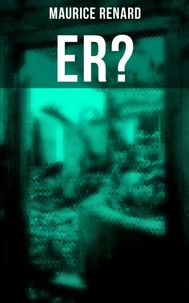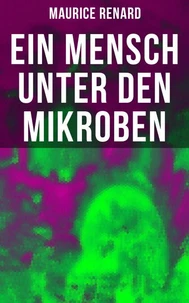New Bodies for Old. Exploring the Ethical Implications of Immortality and Body Transformation in Early 20th Century Science Fiction
Par :Formats :
Disponible dans votre compte client Decitre ou Furet du Nord dès validation de votre commande. Le format ePub est :
- Compatible avec une lecture sur My Vivlio (smartphone, tablette, ordinateur)
- Compatible avec une lecture sur liseuses Vivlio
- Pour les liseuses autres que Vivlio, vous devez utiliser le logiciel Adobe Digital Edition. Non compatible avec la lecture sur les liseuses Kindle, Remarkable et Sony
 , qui est-ce ?
, qui est-ce ?Notre partenaire de plateforme de lecture numérique où vous retrouverez l'ensemble de vos ebooks gratuitement
Pour en savoir plus sur nos ebooks, consultez notre aide en ligne ici
- Nombre de pages338
- FormatePub
- ISBN406-4-06-624646-4
- EAN4064066246464
- Date de parution05/12/2019
- Protection num.Digital Watermarking
- Taille549 Ko
- Infos supplémentairesepub
- ÉditeurGOOD PRESS
Résumé
Maurice Renard's "New Bodies for Old" delves into the intersection of technology and humanity, exploring the implications of scientific advancements on individual identity and society. Encompassing elements of science fiction and philosophical discourse, the narrative presents a thought-provoking examination of the human condition through the lens of body modification and transference. Renard's prose is both lyrical and precise, reflecting the anxieties of a world grappling with rapid technological change in the early 20th century, situated within the broader context of French literature which was increasingly exploring dystopian and speculative themes in a post-war era.
Renard, a noted figure in early French science fiction, often grappled with the transformative potential of scientific discovery, which is evident in his personal background in literature and mechanical engineering. His fascination with the implications of bodily autonomy, coupled with the philosophical inquiries into what constitutes a 'self, ' informs his narrative style and thematic concerns. These elements demonstrate his ability to merge imaginative storytelling with critical reflections on contemporary societal issues.
"New Bodies for Old" is highly recommended for readers interested in the nuances of human identity amidst technological evolution. This compelling and reflective novel challenges readers to contemplate their own relationship with progress and the ethical underpinnings of scientific innovation, making it a timeless read for both enthusiasts of speculative fiction and philosophy.
Renard, a noted figure in early French science fiction, often grappled with the transformative potential of scientific discovery, which is evident in his personal background in literature and mechanical engineering. His fascination with the implications of bodily autonomy, coupled with the philosophical inquiries into what constitutes a 'self, ' informs his narrative style and thematic concerns. These elements demonstrate his ability to merge imaginative storytelling with critical reflections on contemporary societal issues.
"New Bodies for Old" is highly recommended for readers interested in the nuances of human identity amidst technological evolution. This compelling and reflective novel challenges readers to contemplate their own relationship with progress and the ethical underpinnings of scientific innovation, making it a timeless read for both enthusiasts of speculative fiction and philosophy.
Maurice Renard's "New Bodies for Old" delves into the intersection of technology and humanity, exploring the implications of scientific advancements on individual identity and society. Encompassing elements of science fiction and philosophical discourse, the narrative presents a thought-provoking examination of the human condition through the lens of body modification and transference. Renard's prose is both lyrical and precise, reflecting the anxieties of a world grappling with rapid technological change in the early 20th century, situated within the broader context of French literature which was increasingly exploring dystopian and speculative themes in a post-war era.
Renard, a noted figure in early French science fiction, often grappled with the transformative potential of scientific discovery, which is evident in his personal background in literature and mechanical engineering. His fascination with the implications of bodily autonomy, coupled with the philosophical inquiries into what constitutes a 'self, ' informs his narrative style and thematic concerns. These elements demonstrate his ability to merge imaginative storytelling with critical reflections on contemporary societal issues.
"New Bodies for Old" is highly recommended for readers interested in the nuances of human identity amidst technological evolution. This compelling and reflective novel challenges readers to contemplate their own relationship with progress and the ethical underpinnings of scientific innovation, making it a timeless read for both enthusiasts of speculative fiction and philosophy.
Renard, a noted figure in early French science fiction, often grappled with the transformative potential of scientific discovery, which is evident in his personal background in literature and mechanical engineering. His fascination with the implications of bodily autonomy, coupled with the philosophical inquiries into what constitutes a 'self, ' informs his narrative style and thematic concerns. These elements demonstrate his ability to merge imaginative storytelling with critical reflections on contemporary societal issues.
"New Bodies for Old" is highly recommended for readers interested in the nuances of human identity amidst technological evolution. This compelling and reflective novel challenges readers to contemplate their own relationship with progress and the ethical underpinnings of scientific innovation, making it a timeless read for both enthusiasts of speculative fiction and philosophy.



